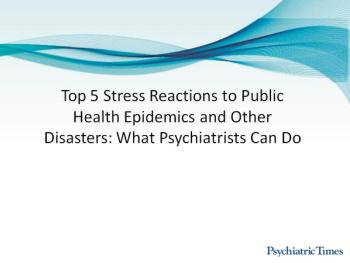
This article summarizes 5 cases from consultation services at several teaching hospitals. These challenging cases illustrate several points for the consultation/liaison psychiatrist to consider in caring for elderly hospitalized patients.

This article summarizes 5 cases from consultation services at several teaching hospitals. These challenging cases illustrate several points for the consultation/liaison psychiatrist to consider in caring for elderly hospitalized patients.

Clinicians will likely encounter increasing numbers of older adults with late-life depression. Advances in our understanding of the neurobiology can help inform diagnosis and prognosis.

Whether by traditional means or via cyberspace, bullying and peer victimization put adolescents at increased risk for suicide, especially when comorbid psychopathology is present.

People experience a spectrum of reactions as a result of epidemics, such as Ebola, and disasters, such as weather-related events. Psychiatrists can provide interventions for those who are in distress with a special focus on mitigating these disaster stress reactions.

Patients with severe depression are more likely to have symptom remission with a combination of cognitive therapy and antidepressant medication than those with less severe or more chronic illness.

In this video, Dr Andrew Solomon talks about how psychiatrists and psychologists can help depressed or traumatized patients foster resilience, without trivializing their pain.

In what psychiatric disorder, if any, has wake therapy been useful to alleviate symptoms? Take the quiz and learn more.

Standardized, quantifiable outcome measures exist for most major psychiatric disorders, yet they are rarely used in routine clinical practice. This article identifies the rationale for using psychiatric scales.

What to do once treatment-resistant depression is established based on risk factors and exclusion of other conditions? Insights here-and a treatment algorithm.

The discovery that a single IV infusion of low-dose (subanesthetic) ketamine exerts rapid antidepressant effects constitutes an expansion in our understanding of the neurobiology of depression and provides new avenues for drug development.

Genius and madness: does one phenomenon cause the other-or do both share a common underlying factor or mechanism? How are geniuses able to accomplish “creative fits”? The author explores both questions.

How can we get even better at customizing treatment for our patients and thereby achieve improved outcomes? How do we avoid becoming relegated to mere brokers of psychopharmacologic commodities? A few thoughts in this brief communication.

The lay press has focused a lot of attention on the use of ketamine as a potentially rapidly acting treatment for depression. But are psychiatrists really ready to offer ketamine as a treatment alternative for mood disorders? An expert weighs in.

Suicide is not being adequately addressed in terms of prevention, and part of that process is better education of mental health professionals and primary care physicians. More in this expert Q&A.

A recently published study found that certain types of stress affect the quality and quantity of men's sperm. The senior author of that study addresses the topic and provides take-away points for psychiatrists in this brief podcast.

The menopausal transition is characterized by sex hormone variability and a vulnerability to depressive symptoms and major depressive episodes. The rate of new-onset major depressive episodes is increased during the menopausal transition, as is the experience of depressive symptoms.

Chronobiology-the science of daily (circadian), monthly, tidal, and seasonal rhythms-has undergone exponential growth in the past decade, with major discoveries at the molecular and neuroanatomic level.

The “story behind the story” is not the over-prescription of antidepressants-though it happens-but the under-availability of optimal treatment.

A brief review of interesting new findings on suicidality and depression treatment in youths.

A mother recalls seeing a donation box with a photo of a little boy with leukemia in a grocery store checkout line but never one of a child with serious mental illness. How can this be if twice as many children and young people die from suicide than those who die of all cancers combined? More in this commentary.

Given the greater frequency of depression than manic episodes in bipolar disorder, what clues indicate bipolar disorder rather than unipolar depression?

Minorities remain less likely to receive diagnosis and treatment for their mental illness and more likely to die by suicide. As ethnocultural diversity within the US grows, psychiatrists are increasingly evaluating attitudes, beliefs, and behaviors of a broad spectrum of ethnocultural groups.

Most patients with psychiatric diagnoses present with sleep disturbances that can have as great an impact on health-related quality of life as the mental illness itself. Here are tips on treatment and chronotherapeutic applications for major depression and other disorders.

An update on the diagnosis, causation, and treatment of chronic depressive problems. The focus is on the recently introduced diagnostic category of persistent depressive disorder.

Most, if not all, antidepressants can cause bothersome adverse effects. These are described here along with strategies to help patients cope.